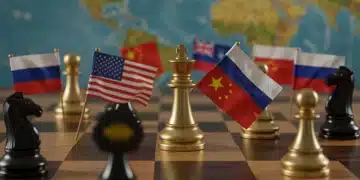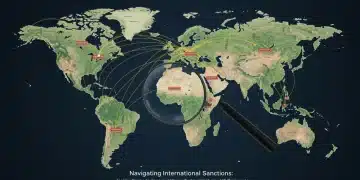New Sanctions: Impact on US Businesses & Consumers

New sanctions on foreign entities significantly reshape the global economic landscape, directly influencing US businesses through supply chain disruptions and market shifts, while impacting consumers via altered product availability and pricing structures, demanding careful adaptation from all stakeholders.
The intricate world of international relations often takes unexpected turns, none more impactful than the imposition of new economic measures. Recently, fresh new sanctions imposed on foreign entities: impact on US businesses and consumers has begun to ripple through the global economy. These measures, designed to achieve specific geopolitical objectives, rarely operate in isolation, and their effects invariably propagate, creating both challenges and opportunities far beyond their immediate targets. Understanding these complex dynamics is crucial for anyone navigating the modern economic landscape.
Understanding the New Sanctions Landscape
The recent wave of sanctions represents a significant shift in diplomatic and economic strategy, targeting specific foreign entities with unprecedented precision. These measures are not merely punitive; they serve as a potent tool of foreign policy, aimed at altering behaviors or limiting capabilities perceived as threats to international stability or national interests. The nature of these new sanctions varies widely, encompassing financial restrictions, trade embargoes, travel bans, and asset freezes, each designed to exert maximum pressure on the designated targets. Several factors contribute to the strategic deployment of such sanctions, including geopolitical tensions, human rights concerns, and security imperatives, underscoring their critical role in shaping global diplomacy.
Delving into the specifics, these sanctions often involve a multi-pronged approach. For instance, financial restrictions might block a sanctioned entity’s access to international banking systems, making it difficult for them to conduct transactions in major currencies like the US dollar. Trade embargoes, on the other hand, prevent the export or import of certain goods and technologies to and from the sanctioned country or entity. Identifying the specific foreign entities affected by these new measures is paramount, as their direct and indirect connections to global supply chains and financial markets determine the scope of the impact. The implications are far-reaching, affecting not just the directly sanctioned entities but also their partners, suppliers, and customers worldwide. This interconnectedness means that even seemingly localized sanctions can have a broad ripple effect, influencing diverse sectors from manufacturing to digital services.
Key Mechanisms of Sanction Implementation
The implementation of sanctions involves a complex regulatory framework, primarily managed by governmental bodies. In the United States, the Department of the Treasury’s Office of Foreign Assets Control (OFAC) plays a central role in administering and enforcing sanctions programs. OFAC maintains various sanctions lists, such as the Specially Designated Nationals and Blocked Persons (SDN) List, which identify individuals and entities with whom U.S. persons are generally prohibited from dealing. Compliance with these regulations is not optional; failure to adhere can result in severe penalties, including hefty fines and even criminal charges. This rigorous enforcement underscores the seriousness with which these measures are imposed and the importance of due diligence for businesses operating internationally.
- Financial Blocking: Freezing of assets and prohibiting transactions.
- Trade Embargoes: Restrictions on import/export of specific goods.
- Sectoral Sanctions: Targeting specific industries or economic areas.
- Travel Bans: Restricting the movement of designated individuals.
Furthermore, the dynamic nature of sanctions means that companies must continuously monitor updates and changes to avoid inadvertent violations. The regulatory landscape is constantly evolving, with new entities added to sanctions lists and existing restrictions modified or expanded. This necessitates robust compliance programs within businesses, ensuring that all operations align with the latest regulations. The global financial system is increasingly scrutinized, making it imperative for banks and financial institutions to implement stringent due diligence to prevent illicit transactions involving sanctioned entities. This proactive approach to compliance is not just about avoiding penalties but also about maintaining corporate reputation and ethical standing in the global marketplace.
Immediate Repercussions on US Businesses
The imposition of new sanctions inevitably creates a cascade of immediate challenges for US businesses, particularly those with global supply chains or international market exposure. One of the most significant impacts stems from disruptions to existing supply chains. Companies that rely on components, raw materials, or finished goods from sanctioned entities or regions must quickly identify alternative sources. This re-routing can lead to increased costs due to longer transit times, higher shipping fees, and the need to establish new vendor relationships. The complexity of these adjustments often results in production delays and, in some cases, a temporary reduction in product availability, directly affecting consumer markets. Businesses must quickly adapt their procurement strategies, seeking out resilient and compliant alternatives to maintain operational continuity.
Beyond supply chain challenges, US businesses face considerable compliance burdens. Navigating the intricate web of sanctions regulations requires specialized legal and financial expertise. Companies must implement enhanced screening processes for customers, suppliers, and transactions to ensure they are not inadvertently dealing with sanctioned entities. This due diligence extends to understanding the ownership structures of foreign partners, as even indirectly linked entities can fall under sanctions. The costs associated with bolstering compliance departments, investing in new software, and conducting regular audits can be substantial, diverting resources from other areas of the business. Smaller businesses, in particular, may find these compliance demands overwhelming without external support.
Financial and Operational Adjustments
The financial implications for US businesses are multifaceted. Companies may experience a freeze or seizure of assets held in sanctioned territories, leading to direct financial losses. Furthermore, the inability to conduct transactions with sanctioned entities can result in write-downs of accounts receivable or the impairment of investments. Operational adjustments extend to redefining market strategies, as businesses may need to withdraw from certain markets or re-evaluate expansion plans that involved sanctioned regions. The shift away from established markets can mean losing competitive advantages built over years, requiring significant investment in developing new market penetration strategies. This necessitates a proactive and agile response, rethinking long-term business goals in light of the evolving geopolitical landscape.
- Increased Compliance Costs: Investment in legal, financial, and technological resources.
- Supply Chain Restructuring: Sourcing new suppliers and re-evaluating logistics.
- Market Access Limitations: Potential loss of revenue from sanctioned markets.
- Reputational Risk: Avoiding association with sanctioned entities to prevent backlash.

Finally, there’s the broader issue of reputational risk. In an era of heightened corporate social responsibility, businesses are increasingly scrutinized not just for their direct actions but also for the actions of their partners. Engaging, even inadvertently, with sanctioned entities can damage a company’s public image and alienate consumers and investors. This makes robust internal controls and clear communication channels essential for managing perceptions and stakeholder expectations. Proactive public relations and transparent reporting can help mitigate negative sentiment, reinforcing a company’s commitment to ethical conduct and international law. The pressure to conform to strict ethical guidelines adds another layer of complexity to business operations in a sanctions-heavy environment.
Impact on US Consumers: Price, Availability, and Choice
While the immediate effects of sanctions often fall on businesses, their repercussions inevitably cascade down to US consumers, influencing everything from the prices they pay to the array of products available on store shelves. The most direct impact is often seen in pricing. When supply chains are disrupted, and businesses must source goods from more distant or expensive suppliers, these increased costs are frequently passed on to the consumer. This can lead to higher prices for a wide range of products, from electronics and clothing to food items and automotive parts, contributing to inflationary pressures. Consumers may find their purchasing power diminished, as everyday goods become more costly, affecting household budgets and discretionary spending.
Availability is another critical factor. Sanctions can restrict the supply of specific products that were previously imported from or manufactured using components from sanctioned foreign entities. This can lead to shortages of certain goods, limiting consumer choice. Highly specialized components, unique raw materials, or niche products may become scarce or disappear from the market entirely, forcing consumers to seek out less familiar alternatives or forgo certain purchases. This disruption is particularly noticeable in sectors where foreign entities hold a dominant market position or supply critical components that are difficult to replicate domestically or from alternative sources. The shift in availability can alter consumer habits globally, pushing towards local alternatives or brand new innovations.
Adaptation and Innovation at the Consumer Level
Beyond price and availability, sanctions can subtly influence consumer choice and preferences over time. As certain products become more expensive or less accessible, consumers might gravitate towards domestic alternatives or goods from unsanctioned countries. This shift can inadvertently boost domestic industries or create new opportunities for businesses that can fill the void left by sanctioned imports. Innovation also plays a role, as companies respond to market changes by developing new products or finding substitute materials, offering consumers novel options they might not have considered before. However, these adaptations take time and may not always fully compensate for the lost variety or affordability.
- Increased Product Prices: Higher costs due to supply chain adjustments.
- Limited Product Availability: Shortages of specific goods or components.
- Reduced Consumer Choice: Less variety in certain market segments.
- Shift in Spending Patterns: Consumers opting for domestic or alternative products.
Moreover, the psychological impact on consumers cannot be overlooked. Uncertainty surrounding economic stability and future supply can lead to changes in saving and spending behaviors. Consumers might become more cautious with their finances, leading to a broader slowdown in economic activity. The media’s portrayal of sanction impacts also shapes public perception, potentially creating anxiety about the economy. Understanding these intricate layers of influence is essential for policymakers and businesses alike, as consumer sentiment plays a crucial role in overall economic resilience. This means that clear communication is vital to manage expectations and prevent unnecessary panic.
Geopolitical Implications and Global Trade Dynamics
The imposition of new sanctions is rarely a standalone event, but rather a move with significant geopolitical underpinnings, reshaping alliances and global trade dynamics. These measures are often intended to exert pressure on targeted nations or entities, signaling disapproval of certain policies or actions. However, every action has a reaction, and sanctions frequently provoke retaliatory measures or lead to new strategic alignments among nations. Countries not directly involved in the dispute may find themselves caught in the crossfire, forced to choose sides or navigate a complex web of conflicting regulations. This can fragment global trade routes, creating new economic blocs and potentially isolating nations that depend heavily on international commerce.
One primary geopolitical implication is the accelerated trend towards de-dollarization. Faced with the risk of their assets being frozen or their access to the SWIFT banking system being cut off, some nations are increasingly exploring alternatives to the US dollar for international trade and reserves. This move, while gradual, could have long-term consequences for the dollar’s status as the world’s primary reserve currency, potentially impacting US financial leverage on the global stage. Coupled with this is the emergence of new trade partnerships and economic corridors, with countries seeking more reliable and sanctions-proof supply chains. These shifts can diversify global economic power, challenging traditional centers of influence and creating a more multipolar world.
Responding to a Fragmented Global Economy
The long-term effects of these geopolitical shifts are difficult to predict but are likely to involve a more fragmented global economy. The drive for “reshoring” or “friend-shoring” of critical industries, where production is moved closer to home or to allied nations, is gaining momentum. This aims to reduce vulnerability to geopolitical shocks and supply chain disruptions, prioritizing national security and economic resilience over pure cost efficiency. Such strategies, while beneficial for national security, may lead to higher production costs and potentially less competitive global markets. Companies must therefore consider the broader geopolitical context when making long-term investment and supply chain decisions, moving beyond short-term cost-benefit analyses.
- De-dollarization Trend: Nations seeking alternatives to the US dollar.
- New Trade Blocs: Formation of alliances based on shared economic interests.
- Supply Chain Reshoring: Bringing production closer to domestic markets.
- Increased Geopolitical Risk: Higher uncertainty in international business environments.

Ultimately, sanctions are a double-edged sword, wielding significant power but also generating unforeseen consequences that reshape the global economic and political landscape. Governments must carefully weigh the intended outcomes against the potential for unintended side effects, including humanitarian impacts and exacerbation of global inequalities. The effectiveness of sanctions as a foreign policy tool is also a subject of ongoing debate, with their success often dependent on broader diplomatic engagement and international cooperation. A nuanced understanding of these geopolitical currents is essential for businesses, policymakers, and consumers alike, as they navigate an increasingly complex and interconnected world where stability is often fleeting.
Mitigating Risks and Adapting to the New Reality
For US businesses and consumers, adapting to the new reality of heightened sanctions requires a proactive and strategic approach to mitigate potential risks and leverage new opportunities. Risk assessment is the foundational step for businesses, involving a thorough review of existing supply chains, customer bases, and financial flows to identify any direct or indirect exposure to sanctioned entities. This necessitates detailed due diligence on all third-party relationships, including suppliers, distributors, and partners. Employing sophisticated analytics and AI-powered tools can significantly enhance the ability to screen for concealed connections and flags that might indicate sanctions violations. Transparency in these processes is increasingly important, not only for regulatory compliance but also for maintaining market trust.
Diversification is another critical strategy. For businesses, this means diversifying supply chains away from single points of failure, especially those linked to regions prone to geopolitical instability or sanctions. Exploring multiple sourcing options, integrating domestic suppliers, and building resilient logistical networks can significantly reduce vulnerability. For consumers, diversification might involve seeking out alternative brands or products that are less susceptible to international disruptions, shifting consumer preferences towards options with more secure supply lines. This broader shift creates new opportunities within the domestic economy, as local businesses are incentivized to expand their capabilities and offerings. The emphasis is on building robustness over simple cost-efficiency to withstand future shocks.
Proactive Planning and Innovation
Beyond diversification, proactive planning and strategic foresight are crucial. Businesses should develop contingency plans for various scenarios, including sudden imposition of new sanctions or escalating geopolitical tensions. This involves identifying alternative markets, establishing emergency communication protocols, and building financial reserves to weather periods of disruption. Innovation also plays a pivotal role in adaptation. Companies can invest in research and development to create new products that are less reliant on sanctioned inputs or to discover new production methods that bypass vulnerable supply chains. This push for innovation can ultimately lead to more sustainable and self-reliant economic ecosystems. Encouraging ingenuity is key to turning challenges into opportunities.
- Enhanced Risk Assessment: Thorough review of all business relationships.
- Supply Chain Diversification: Reducing reliance on single points of origin.
- Contingency Planning: Preparing for unforeseen disruptions and market shifts.
- Investment in Innovation: Developing new products and processes.
For consumers, adapting means becoming more informed about the origins of products and understanding the broader economic landscape. Supporting businesses that demonstrate resilience and ethical sourcing can contribute to a more stable marketplace. Governments also have a role to play in supporting businesses through these transitions, offering guidance, resources, and potentially financial incentives for companies to adapt. Collaboration between government and industry can foster a more resilient economy, capable of absorbing the shocks of geopolitical changes. By embracing adaptation and innovation, both businesses and consumers can navigate the complex waters of international sanctions more effectively, turning potential setbacks into opportunities for growth and resilience.
Ethical Considerations and Corporate Responsibility
The imposition of new sanctions raises significant ethical considerations for US businesses, extending beyond mere compliance to encompass broader issues of corporate social responsibility. While adhering to sanctions is a legal imperative, companies must also grapple with the human impact of these measures, particularly in nuanced situations. For instance, sanctions designed to target specific regimes can sometimes have unintended consequences, affecting the general population of the sanctioned country, impacting access to essential goods, or hindering humanitarian efforts. Businesses operating in these complex environments face a delicate balance between legal compliance and ethical duty. This means thoughtful deliberation is required beyond simply following the letter of the law, considering the spirit and broader ethical implications.
Furthermore, the ethical sourcing of components and materials becomes paramount. As supply chains are rerouted due to sanctions, businesses must ensure that new suppliers meet ethical labor standards and environmental regulations. There is a heightened risk of inadvertently engaging with unethical practices when hastily seeking alternative sources. Companies are increasingly expected to demonstrate due diligence not only in terms of sanctions compliance but also in upholding human rights and sustainable practices throughout their global operations. This demands comprehensive audits and transparent reporting, building trust with consumers and stakeholders who are increasingly conscious of a company’s social and environmental footprint. Brands that fail to maintain these standards risk significant reputational damage and consumer backlash, signaling a shift in market priorities.
Transparency and Stakeholder Engagement
Transparency is a cornerstone of corporate responsibility in an era of sanctions. Businesses should clearly communicate their compliance strategies and ethical frameworks to investors, employees, and consumers. Open dialogue about the challenges and adjustments being made in response to sanctions can foster trust and demonstrate a commitment to ethical conduct. Engaging with stakeholders, including NGOs and industry groups, can also provide valuable insights into the broader impacts of sanctions and help companies navigate ethical dilemmas. This collaborative approach ensures that diverse perspectives are considered, leading to more robust and responsible business practices. By actively seeking input, companies can refine their strategies and ensure they align with evolving ethical standards.
- Humanitarian Impact: Assessing and mitigating unintended harm to civilians.
- Ethical Sourcing: Ensuring new supply chains uphold labor and environmental standards.
- Transparency: Openly communicating compliance and ethical frameworks.
- Stakeholder Engagement: Collaborating with NGOs and industry for responsible practices.
The pressure on businesses to act as responsible global citizens is intensifying. This includes advocating for carefully targeted sanctions that minimize harm to innocent civilians, and collaborating with international bodies to ensure humanitarian aid can reach those in need. Corporate responsibility in the context of sanctions extends beyond individual company actions to participation in broader policy discussions, contributing to a more effective and ethical application of these powerful tools. Ultimately, businesses that prioritize ethical considerations alongside legal compliance will not only protect their reputation but also contribute to a more just and stable global economy, demonstrating leadership in an increasingly complex world.
Future Outlook: Navigating an Evolving Global Economy
As the global economic landscape continues to be shaped by geopolitical shifts and the ongoing use of sanctions, forecasting the future outlook requires a nuanced understanding of these evolving dynamics. The trend towards a more fragmented global economy seems likely to persist, with countries prioritizing resilience and national security over complete economic integration. This does not necessarily mean an end to globalization, but rather a redefinition of its terms, with greater emphasis on diversified supply chains and regional partnerships. For US businesses, this implies a continued need for agility and adaptability, constantly monitoring geopolitical developments and adjusting strategies accordingly. The ability to pivot quickly will be a key differentiator in a world where stability can be unpredictable.
Technological advancement will also play a crucial role in shaping the future. The development of new payment systems, independent of traditional financial infrastructures prone to sanctions, could further contribute to de-dollarization and the emergence of alternative economic power centers. Innovations in manufacturing, such as additive manufacturing and robotics, may enable more localized production, reducing reliance on distant and potentially vulnerable supply chains. These technological shifts offer both challenges and opportunities, demanding investment in research and development to remain competitive. Recognizing these trends early can help businesses position themselves for future success, making strategic investments in areas that promise long-term resilience.
Policy Responses and International Cooperation
The future effectiveness and application of sanctions will also depend heavily on policy responses and the degree of international cooperation. There is an increasing recognition among policymakers of the need for more carefully targeted sanctions that minimize unintended consequences and humanitarian impact. This may lead to more multilateral approaches to sanctions, encouraging broader international consensus and shared responsibility. The debate over the efficacy of sanctions as a foreign policy tool will continue, prompting ongoing evaluation and refinement of these measures. US businesses and consumers should remain informed about these policy discussions, as they directly influence the economic environment. The aim is to create tools that are both effective and responsible, promoting global stability without causing excessive collateral damage.
- Continued Economic Fragmentation: Prioritization of resilience over full integration.
- Technological Innovation: Development of new payment systems and manufacturing methods.
- Evolving Sanctions Policies: Focus on targeted measures and international cooperation.
- Increased Supply Chain Reshoring: Emphasis on regional and domestic production.
Ultimately, navigating this evolving global economy will require a blend of strategic foresight, operational agility, and a commitment to ethical conduct. Businesses that can quickly identify and adapt to new challenges, diversify their operations, and leverage technological advancements will be best positioned for sustained success. For consumers, understanding the interconnectedness of global events and their local impact will foster more informed purchasing decisions and greater economic awareness. The future landscape is one of continuous change, where vigilance and adaptability will be more valuable than ever, defining the new normal for global commerce.
| Key Point | Brief Description |
|---|---|
| ⛓️ Supply Chains | Disruptions leading to higher costs & need for diversification. |
| 💲 Consumers | Price increases, limited availability, and shifted preferences. |
| 🌐 Geopolitics | Reshaping trade, alliances, and de-dollarization trends. |
| 🤝 Adaptation | Businesses and consumers must innovate and diversify to thrive. |
Frequently Asked Questions About Sanctions
New sanctions are typically imposed to achieve specific foreign policy objectives, such as pressuring governments or entities to cease objectionable activities, promoting human rights, combating terrorism, or limiting the proliferation of weapons. They aim to alter behavior by imposing economic costs on the targeted entities. Understanding these motivations is key to grasping the broader geopolitical context of sanctions, as they are not merely punitive measures.
New sanctions can impact US consumers in several ways, primarily through increased prices for goods due to supply chain disruptions and higher import costs. They can also lead to limited availability of certain products that were previously sourced from or manufactured using components from sanctioned entities. Consumers might also see a reduction in overall product choice and a shift in their spending habits towards domestic alternatives, gradually reshaping market dynamics over time.
“De-dollarization” refers to the trend of countries reducing their reliance on the US dollar for international trade and reserves. This trend is often accelerated by sanctions, as nations seek to minimize their vulnerability to US financial leverage. By diversifying their currency holdings and developing alternative payment systems, countries aim to insulate their economies from potential financial restrictions, signaling a long-term shift in global financial power dynamics.
US businesses can mitigate risks by conducting thorough risk assessments of their global operations, diversifying supply chains to reduce reliance on vulnerable regions, and implementing robust compliance programs. This includes strict due diligence on all partners and transactions. Proactive contingency planning and investing in innovation to develop less reliant products are also crucial strategies. These measures ensure resilience and adaptability in an ever-changing international economic landscape, minimizing operational disruptions and financial exposure.
Yes, businesses face significant ethical considerations beyond legal compliance. Sanctions can have unintended humanitarian consequences, affecting civilian populations. Companies must strive for ethical sourcing in new supply chains, ensuring labor and environmental standards are met. Transparency with stakeholders and engaging in broader policy discussions to advocate for more targeted and humane sanctions are also important aspects of corporate social responsibility in this complex environment. This comprehensive approach aligns with evolving ethical expectations.
Conclusion
The landscape reshaped by new sanctions imposed on foreign entities: impact on US businesses and consumers is undeniably complex, presenting both formidable challenges and unique opportunities. For US businesses, success hinges on an unwavering commitment to compliance, coupled with an agile approach to supply chain diversification and strategic risk mitigation. They must not only adapt to shifting regulations but also innovate to circumvent new barriers, potentially leading to more resilient and localized production. Consumers, in turn, face a dynamic marketplace characterized by evolving prices and product availability, where informed choices become increasingly important. Globally, these sanctions accelerate geopolitical realignments, pushing nations towards new trade partnerships and economic models, challenging traditional paradigms. Navigating this intricate web demands continuous vigilance, a deep understanding of interconnected economic forces, and a proactive stance from all stakeholders. Ultimately, the ability to adapt and build resilience across national and economic boundaries will define success in this intricate and ever-evolving global environment.





